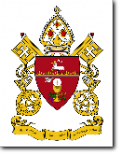Declaration of Utrecht
THE DECLARATION OF UTRECHT
A TRANSLATION OF THE PROFESSION OF FAITH, OR DECLARATION, FORMULATED BY THE OLD CATHOLIC BISHOPS ASSEMBLED AT UTRECHT, SEPTEMBER 24th, 1889
A TRANSLATION OF THE PROFESSION OF FAITH, OR DECLARATION, FORMULATED BY THE OLD CATHOLIC BISHOPS ASSEMBLED AT UTRECHT, SEPTEMBER 24th, 1889
1. We adhere faithfully to the Rule of Faith laid down by St. Vincent of Lerins in these terms: "Id teneamus, quod ubique, quod semper, quod ab omnibus creditum est; hoc est etenim vere proprieque catholicum." (Hold fast that faith which has been believed everywhere [universally], always, and by all.) For this reason we persevere in professing the faith of the primitive Church, as formulated in the ecumenical synods and specified precisely by the unanimously accepted decisions of the Ecumenical Councils held in the undivided Church of the first thousand years.
2. We therefore reject the decrees of the so-called Council of the Vatican, which were promulgated July 18th, 187O, concerning the infallibility and the universal Episcopate of the Bishop of Rome, decrees which are in contradiction with the faith of the ancient Church, and which destroy its ancient canonical constitution by attributing to the Pope the plenitude of ecclesiastical powers over all Dioceses and over all the faithful. By denial of his primatial jurisdiction we do not wish to deny the historic primacy which several Ecumenical Councils and the Fathers of the ancient Church have attributed to the Bishop of Rome by recognizing him as the Primus inter pares (first among equals).
3. We also reject the dogma of the Immaculate Conception promulgated by Pius IX in 1854 in defiance of the Holy Scriptures and in contradiction to the tradition of the first centuries.
4. As for other Encyclicals published by the Bishops of Rome in recent times - for example, the Bulls Unigenitus and Auctorem Fidei, and the Syllabus of 1864 - we reject them on all such points as are in contradiction with the doctrine of the primitive Church, and we do not recognize them as binding on the consciences of the faithful. We also renew the ancient protests of the Catholic Church of Holland against the errors of the Roman Curia, and against its attacks upon the rights of national Churches.
5. We refuse to accept the decrees of the Council of Trent in matters of discipline, and as for the dogmatic decisions of that Council we accept them only so far as they are in harmony with the teaching of the primitive Church.
6. Considering that the Holy Eucharist has always been the true central point of Catholic worship, we consider it our duty to declare that we maintain with perfect fidelity the ancient Catholic doctrine concerning the Sacrament of the Altar, by believing that we receive the Body and the Blood of our Saviour Jesus Christ under the species of bread and wine.
The Eucharistic celebration in the Church is neither a continual repetition nor a renewal of the expiatory sacrifice which Jesus offered once for all upon the Cross; but it is a sacrifice because it is the perpetual commemoration of the sacrifice offered upon the Cross, and it is the act by which we represent upon earth and appropriate to ourselves the one offering which Jesus Christ makes in Heaven, according to the Epistle to the Hebrews ix. 11, 12, for the salvation of redeemed humanity, by appearing for us in the presence of God (Heb. ix. 24). The character of the Holy Eucharist being thus understood, it is, at the same time, a sacrificial feast, by means of which the faithful, in receiving the Body and Blood of our Saviour, enter into communion with one another (1 Cor. X. 17).
7. We hope that Catholic theologians, in maintaining the faith of the undivided Church, will succeed in establishing an agreement upon questions which have been controverted [i.e. in controversy - Ed.] ever since the divisions which have arisen between the Churches. We exhort the priests under our jurisdiction to teach, both by preaching and by the instruction of the young, especially the essential Christian truths professed by all the Christian confessions, to avoid, in discussing controverted doctrines, any violation of truth or charity, and in word and deed to set an example to the members of our churches in accordance with the spirit of Jesus Christ our Saviour.
8. By maintaining and professing faithfully the doctrine of Jesus Christ, by refusing to admit those errors which by the fault of men have crept into the Catholic Church, by laying aside the abuses in ecclesiastical matters, together with the worldly tendencies of the hierarchy, we believe that we shall be able to combat efficaciously the great evils of our day, which are unbelief and indifference in matters of religion.

